US health officials propose using a cheap antibiotic as a ‘morning-after pill’ against STDs



apnews.com
U.S. health officials plan to endorse a common antibiotic as a morning-after pill that gay and bisexual men can use to try to avoid some increasingly common sexually transmitted diseases.
The proposed CDC guideline was released Monday, and officials will move to finalize it after a 45-day public comment period. With STD rates rising to record levels, “more tools are desperately needed,” said Dr. Jonathan Mermin of the Centers for Disease Control and Prevention.
The proposal comes after studies found some people who took the antibiotic doxycycline within three days of unprotected sex were far less likely to get chlamydia, syphilis or gonorrhea compared with people who did not take the pills after sex.
You are viewing a single comment
I thought we were supposed to be more restrictive with antibiotics, not less.
My gut reaction says the same thing. Often taking a heavy handed approach and completely knocking out a disease before it can take a foothold would prevent it from being able to mutate a resistance.
It could be (which would need to be backed up by proper studies and science, which hopefully this decision is based on) that early usage of doxycycline would be better than the alternative, which is letting the disease take hold, then trying to eliminate it after the fact.
I assume, like the morning after pill, this would be intended to be used in rare cases of unintended infection, and not as a common prophylactic. Such as in SA, or one off broken condom situations, or when someone is discovered to have an STD shortly after sexual contact.
Unless an antibiotic is incredibly specific to the target, it's still going to kill other bacteria in your body. Those bacteria can become more and more resistant, and then those newly resistant bacteria can pass it on to more harmful bacteria.
So we should be trying to reduce it either way.